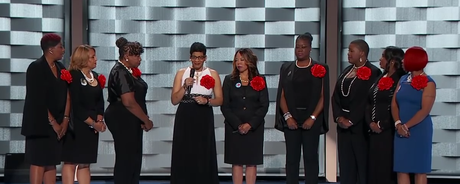
Mothers of the Movement.
On Tuesday, July 26th, several mothers of police brutality victims spoke at the Democratic National Convention in Philadelphia. United by the organization Mothers of the Movement, the women joined together to speak about their purpose as a coalition and show support for Hillary Clinton.
Geneva Reed-Veal, mother of Sandra Bland, spoke first as audience members chanted “Black Lives Matter.” She commenced by talking about what it was like when her daughter was found hanging in her jail cell after an unlawful arrest one year ago. She went on to say the names of six other women who died in custody in the month of July of 2015, including Kindra Chapman, Sarah Lee Circle Bear, Raynette Turner, Ralkina Jones, Joyce Curnell, and Alexis McGovern.
Lucia McBath, mother of Jordan Davis, continued.
“You don’t stop being a mom when your child dies,” she said. “His life ended the day he was shot and killed for playing loud music, but my job as a mother didn’t.” McBath spoke about what her son was like and drew attention to Jordan Davis’s life — not his death, which is all the public has seen.
Sybrina Fulton, mother of Trayvon Martin, continued the momentum of sharing narratives. She calls herself an “unwilling participant in this movement” saying that she would not have signed up for this. She says, “I did not want this spotlight but I will do everything I can to focus some of this light on the pain of a path out of this darkness.”
Six other women — Gwen Carr (mother of Eric Garner), Wanda Johnson (mother of Oscar Grant), Maria Hamilton (mother of Dontre Hamilton), Annette Nance-Holt (mother of Blair Holt), Cleopatra Pendleton-Cowley (mother of Hadiya Pendleton), and Lezley McSpadden (mother of Michael Brown) — stood on stage in solidarity.
According to ABC News, the movement was formed after Clinton traveled to Chicago in November of 2015 to hear these mothers voice their own narratives and loss. When one mother asked “What can we do?” Hillary responded, “I think you can continue to speak out, but you will be more effective if you do somehow band together, so that it’s a constant drumbeat. As to say, ‘Look we are citizens, we are mothers, we lost children. This is not only wrong, it is unacceptable, and here are the things that need to happen to try to prevent this from ever happening again.'”
Since that meeting, the women banded together. They have traveled across the country and continue to speak on behalf of their children. They are sharing their stories and advocating for legislation changes and, ultimately, justice for the lives of those taken by senseless violence.
But while the Mothers of the Movement spoke at a political convention, their message was about more than policy: It was about the deep rooted issues of racism and police brutality in our nation, and naming it as a problem that deserves center stage. This speech furthermore highlighted one of the most incredible things about the entire movement against police brutality: the strength displayed by so many people who have been touched by such senseless violence. What made this particular speech and group that gave it even more impactful, however, was that each woman who spoke did so in a voice of raw courage and power. Hillary Clinton has included gun control and race relations in her political platform, but the mothers of police violence victims stood together to humanize the issues at hand and make sure that the names of their sons and daughters and so many others aren’t forgotten.
While the Black Lives Matter movement continues to push for racial equality and justice for black lives and voices in America, it has often centered on the lives of black men in particular. Many have argued that doing so has overlooked the lives of black women that have been affected by police and gun violence — like Natasha McKenna, Miriam Carey, Tanisha Anderson, and so many more.
Making groups like the Mothers of the Movement so visible, therefore, does much to bridge the gendered divide in this crucial movement. Additionally, hearing the mothers of police violence victims speak about their children’s lives is particularly important given how the media often focuses only on their deaths. Remembering these individuals’ names and hearing their mothers humanize them gives us the ability to diverge from what the media projects and see these victims in a new light — as humans whose lives matter.

